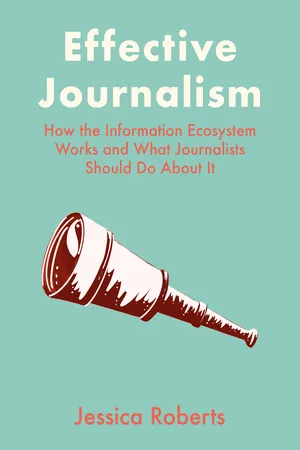
Effective Journalism
How the Information Ecosystem Works and What Journalists Should Do About It
- English
- ePUB (mobile friendly)
- Available on iOS & Android
Effective Journalism
How the Information Ecosystem Works and What Journalists Should Do About It
About this book
This book provides journalists and the public with a broad overview of all the ways modern communication technologies and information approaches make it difficult for people to effectively find and interpret information, and what they can do about it. The public may have a general awareness that things like confirmation bias, content algorithms, and the backfire effect exist and can influence their behaviour, but this book will explain them in one place, in plain language. Journalists likewise know that their audiences are dealing with some of these issues, but continue to operate under the assumption that if they just publish facts, the truth will win out in the court of public opinion.
The central argument of the book is that journalists and audiences can no longer afford to pretend that all information is competing on an even playing field, and that it is enough for journalists to simply publish "the facts." Just as behavioural economics provided a new way of thinking about economics, one that understood people as non-rational actors, this book attempts to explain the reality, rather than the ideal, of how people seek and process information, and what journalists and their audiences can do to try to create an informed public in the face of that reality.
For many American journalists, their work and their responsibility to the public is grounded in the concept of a marketplace of ideas. Journalists believe they should just report the facts, as neutrally as possible, and let the public judge those facts and put them in context. The marketplace of ideas requires individuals to rationally consider the information that is presented to them and weigh it against other available information. Through this process, bad ideas will be judged and dismissed, and good ideas will win out. We might like to believe that we are all capable of carefully and rationally evaluating information, but the evidence is clear that it is simply not true. If it were true, we would not observe such things as the continued persistence of flat-Earthers and moon-landing sceptics, and others who champion backward social ideas that were dismissed decades or even centuries ago. The fact that these ideas continue to persist tells us that the public is not engaging in a clear-eyed rational consideration of all the available verified facts.
Frequently asked questions
- Essential is ideal for learners and professionals who enjoy exploring a wide range of subjects. Access the Essential Library with 800,000+ trusted titles and best-sellers across business, personal growth, and the humanities. Includes unlimited reading time and Standard Read Aloud voice.
- Complete: Perfect for advanced learners and researchers needing full, unrestricted access. Unlock 1.4M+ books across hundreds of subjects, including academic and specialized titles. The Complete Plan also includes advanced features like Premium Read Aloud and Research Assistant.
Please note we cannot support devices running on iOS 13 and Android 7 or earlier. Learn more about using the app.
Information
Table of contents
- Cover
- Title
- Copyright
- Contents
- Acknowledgements
- Introduction
- PART I STRUCTURAL CHALLENGES IN OUR INFORMATION ECOSYSTEM
- PART II COGNITIVE AND AFFECTIVE BARRIERS TO PROCESSING INFORMATION
- PART III THE SOLUTIONS
- 10. Empathy Cultivation and Building Community
- 11. Effective Journalism Practices
- 12. Solutions for Tech Companies, Government, and the Public
- Conclusion
- Index
- Back Cover